Sitting in front of us, at the end of the dinner, there’s a poised, serene, assertive, and smiling guy. The determination that has always characterised him has not disappeared. In fact, it seems it has acquired a new shape: that of a tranquil self-awareness. And this increased relaxation shows in his dishes: they’ve never been so precise, so neat, so captivating. Always extremely rich in technique, daringly original, fascinatingly creative; the result of endless crossovers of geography and tastes; but also full; complete (in the sense they’re fully accomplished in their complexity) and infinite (because of their complexity, which paves the way for endless options, as usual). A truly superb dinner. Ah, the name of that guy is Michelangelo Mammoliti.

Mammoliti and his brigade
We have the impression that Mammoliti, only 34 – he was born in 1985, – has found the right proportions, he has found a good balance in his work method. This is a huge accomplishment, which makes of him a young creative who’s already mature: a perfect circumstance, that of the daring person who learns to soften his edges and becomes a fire that warms without burning. If he’ll keep these standards, this may well be the prodrome of a long and brilliant career: from pure talent, something that has always been acknowledged, to proven reality.
We say all this because the dinner he prepared a few weeks ago was impeccable for at least two reasons:
1) The personality and the style: Mammoliti shows better organisation but remains himself, a chef with a strong personality, who elaborates influences but is not subjected to them; he shapes the journey, the discovery, the memory, drawing from a series of experiences that is more and more varied and rich, and thus month after month, year after year, it becomes like a treasure chest of craveable wisdom, from which the chef draws as he wishes, finding the resources to enrich his research;
2) the rhythm: at
La Madernassa the timing and distribution of the courses in the tasting menu was perfect. What was once – in my opinion – the limit of a younger
Mammoliti (that is to say until recently), always pushing further, at all costs, his tendency to accelerate even when facing a bend, with the risk of swerving, has been replaced by a stronger mastery of expression. Attention, though: this doesn’t mean he’s lost his identity. If anything, he pays more attention to clients.

The brigade at La Madernassa: on the bench, to the right, sommelier Alessandro Tupputi. Wearing a shirt, patron Fabrizio Ventura
at the beginning of the dinner remains faithful to his personal precise style: plenty of appetizers. However, the selection has improved. Now vegetables dominate, with all the relative lightness and freshness. Sommelier
Alessandro Tupputi, a young and very passionate Apulian, pairs them with a
Bellini from
Slavcek, the producer – in Slovenian Collio – of both the peach juice and the Triple A sparkling wine (at
La Madernassa 700 of the 1700 wines are natural wines), plus petals of verbena and marigolds; this is followed by a gin tonic (
Wolfrest Gin, tonic water with quinine, powdered beetroot, wisteria syrup
maison). The photo of the dishes are from
Tanio Liotta.
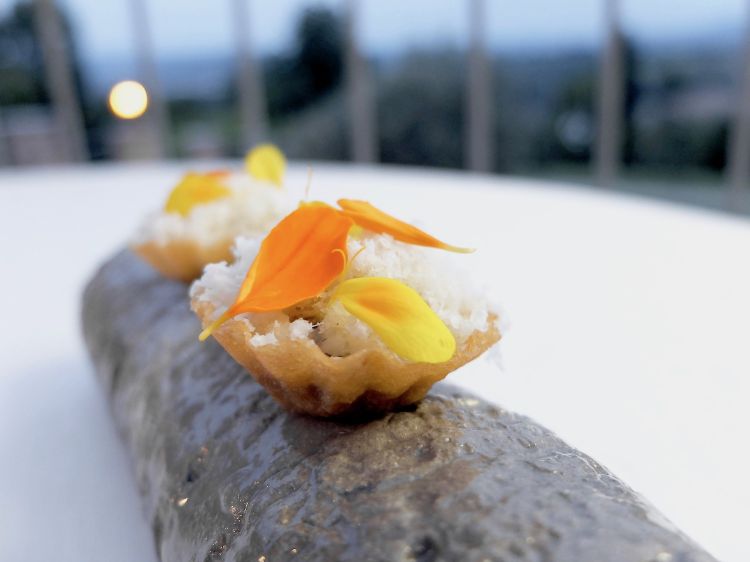
Tartellette with cream of champignons and grated macadamia
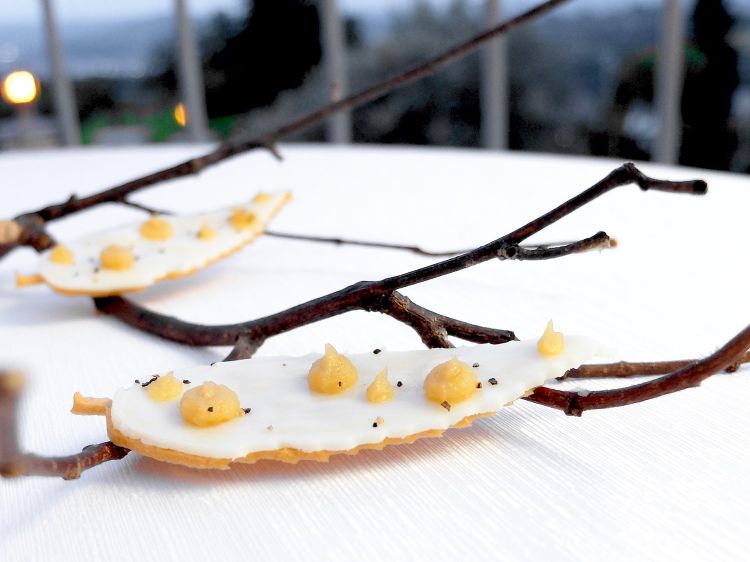
Chestnut leaves with cacio e pepe
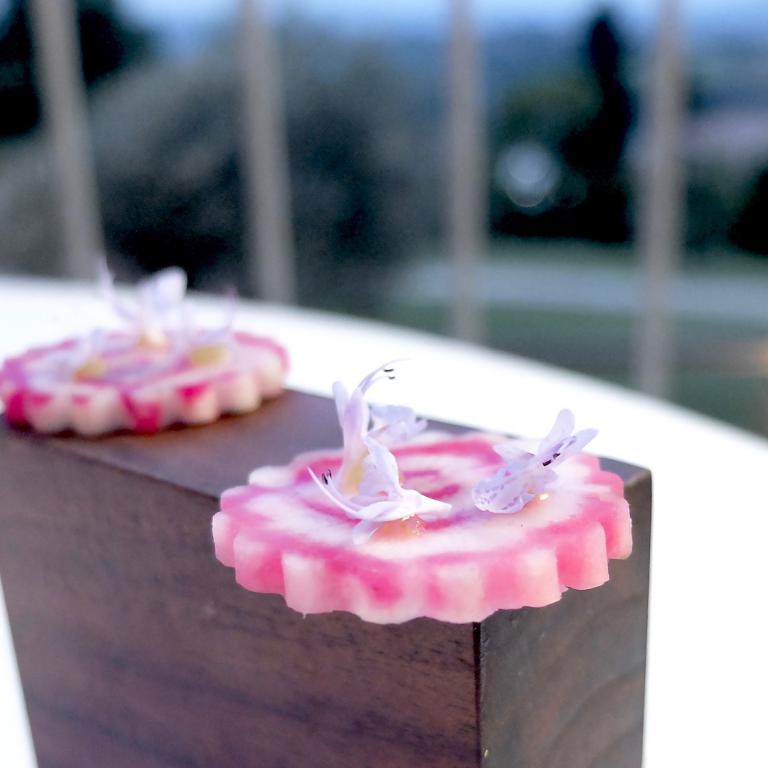
Beetroot from Chioggia with yuzukoshō (a fermented Japanese paste made with chilli pepper, yuzu zest and salt)
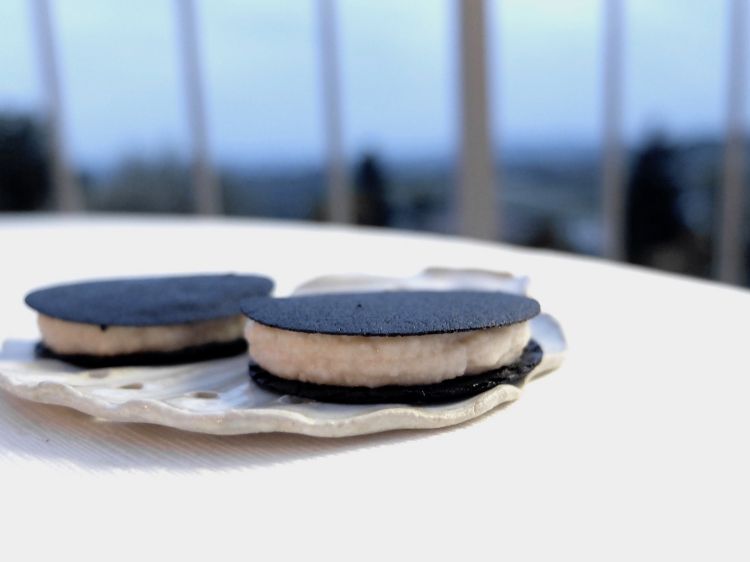
Tuille with squid ink, tuna mousse
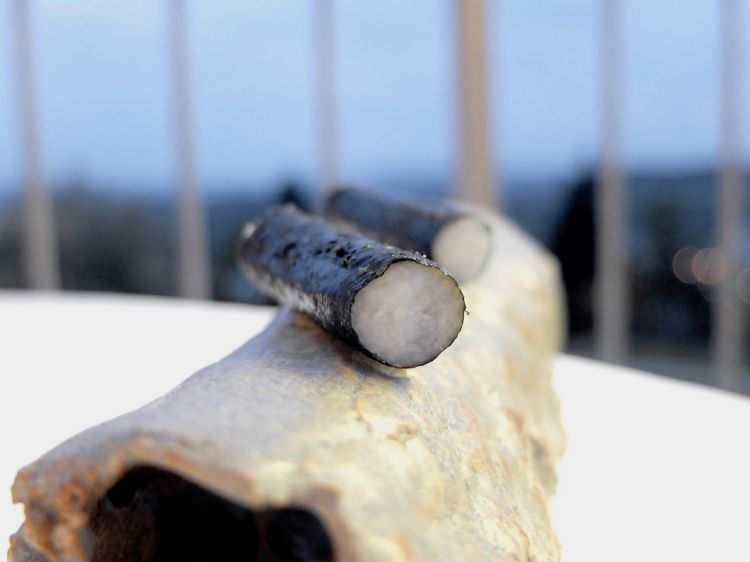
Rice kimbap and marinated mackerel. Kimbap is "Korean sushi"
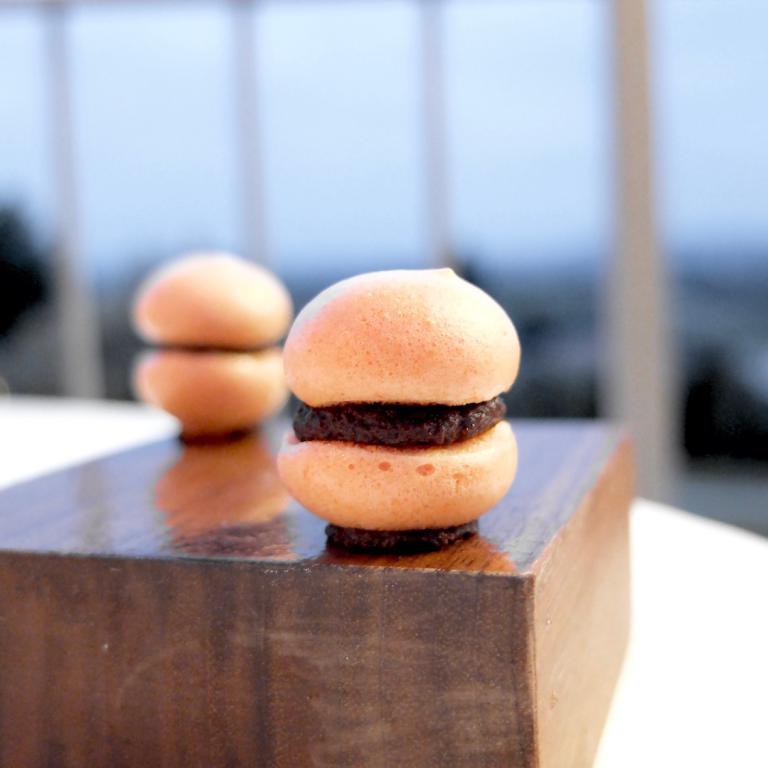
Tomato meringue and paste of roasted tomato
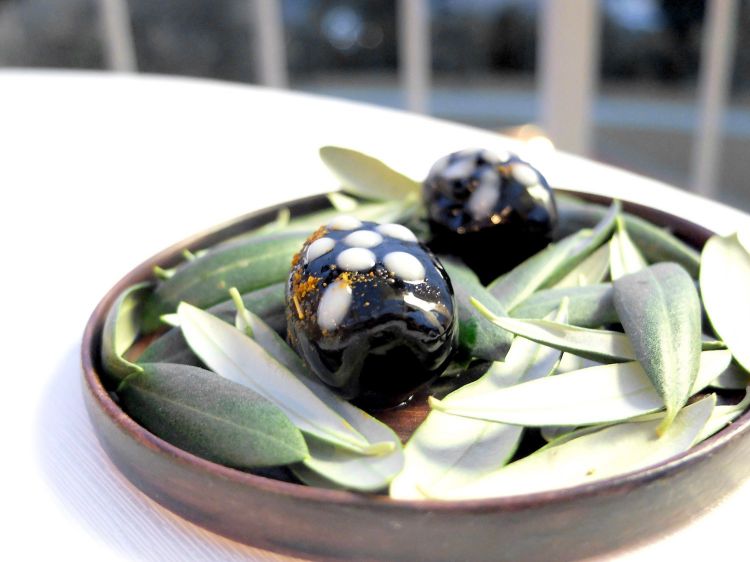
Potatoes and salted black olives
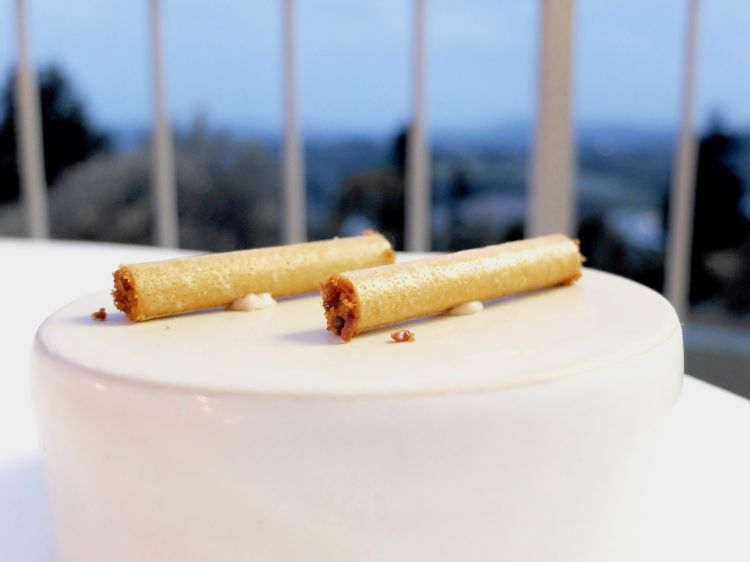
Crispy tube of bechamel with jowl bacon
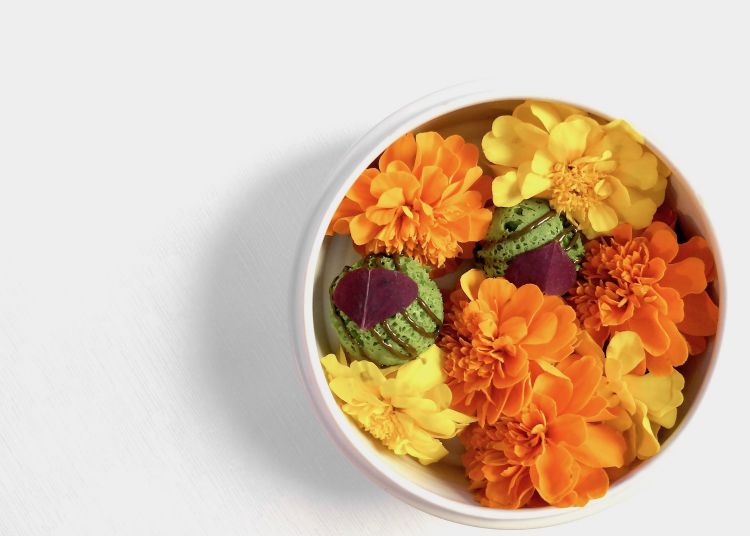
Vegetal takoyaki with wild garlic and pistachios from Bronte
Then, an exceptional triptych, a showstopper, dedicated to tomato. In the glass, Tomato water with vanilla from Tahiti and rum agricole, a drink to sip between one bite and the other of the Oreiller de la belle Aurore with beefsteak tomato and the Puffed crackers with cream of anchovies and tomato, served with a selection of cherry tomatoes from the vegetable garden. The palate is invaded by very elegant aromas, the tomato shows endless different nuances of flavours. A brilliant idea.
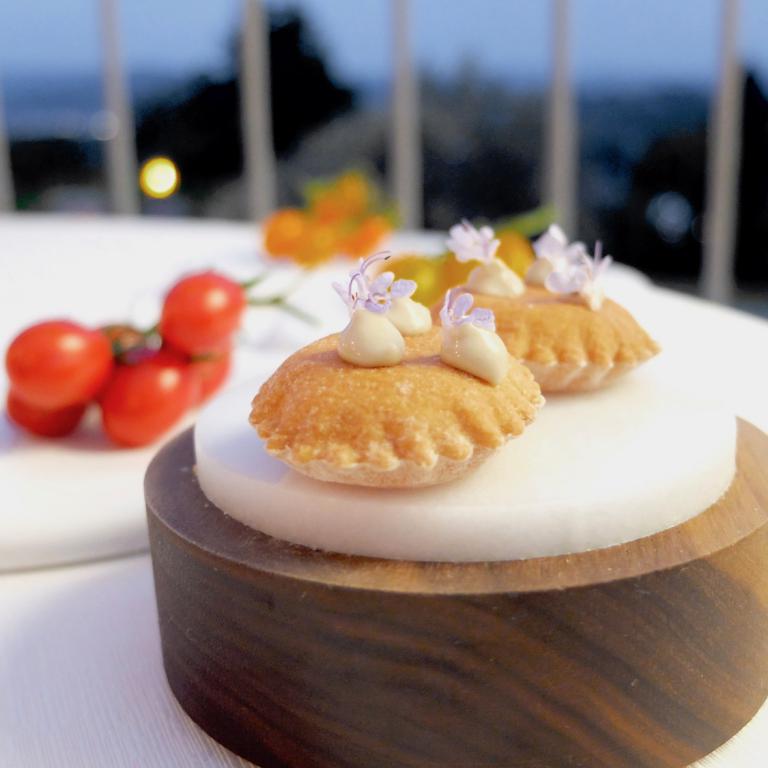
Puffed crackers with cream of anchovies and tomato. You can eat them with three types of tomatoes (in the background), chosen among the 60 available in the vegetable at La Madernassa. In the glass, tomato water with vanilla from Tahiti and rum agricole
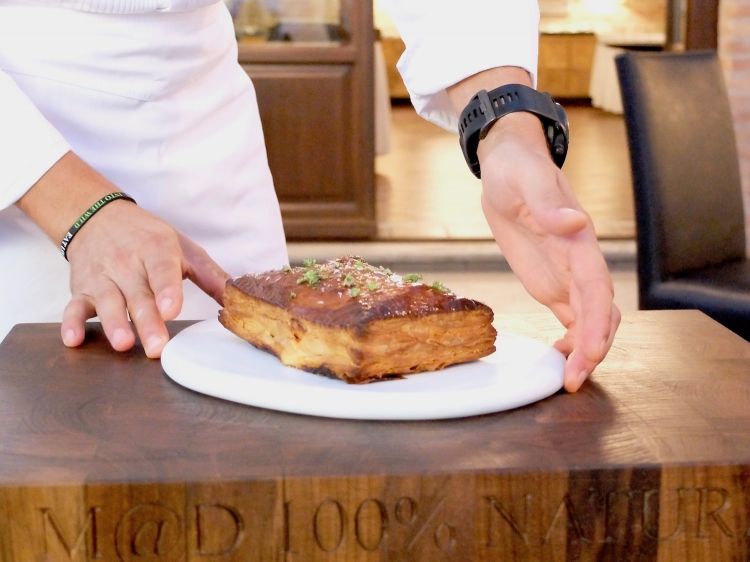
Oreiller de la belle Aurore, a very classic French pastry (oreiller means "pillow"). The traditional version has a very rich filling (ten different types of meat, truffle, pistachios, mushrooms); Mammoliti simplifies: only beefsteak tomatoes, oregano and basil
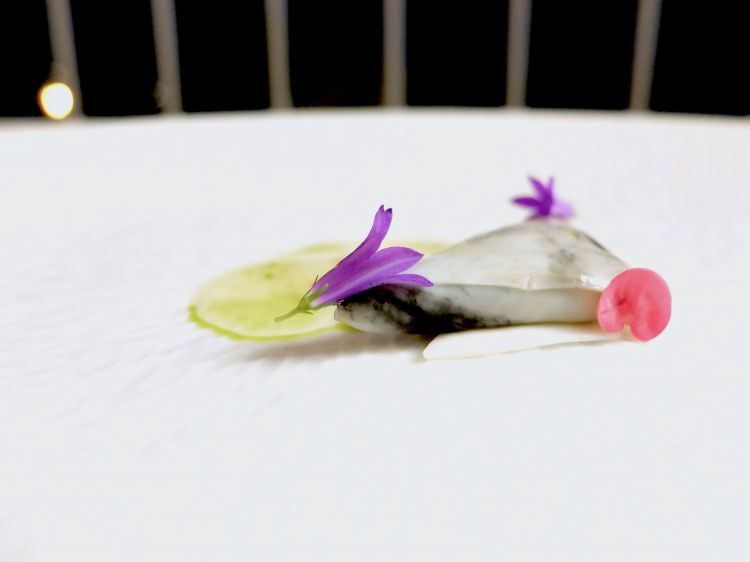
Marmoreo: fine veil of calamaro, som tam seasoning like a papaya salad
The real dishes begin. Marmoreo is inspired by the chef’s latest trip to Thailand. It’s very balanced: som tam, an emulsion of green papaya, adds a delicate acidity to the aromatic meatiness of the calamary (as a veil, and as a tartare with coriander), to the sweetness of the rice and coconut cream, to the floral notes of begonia and pansies.
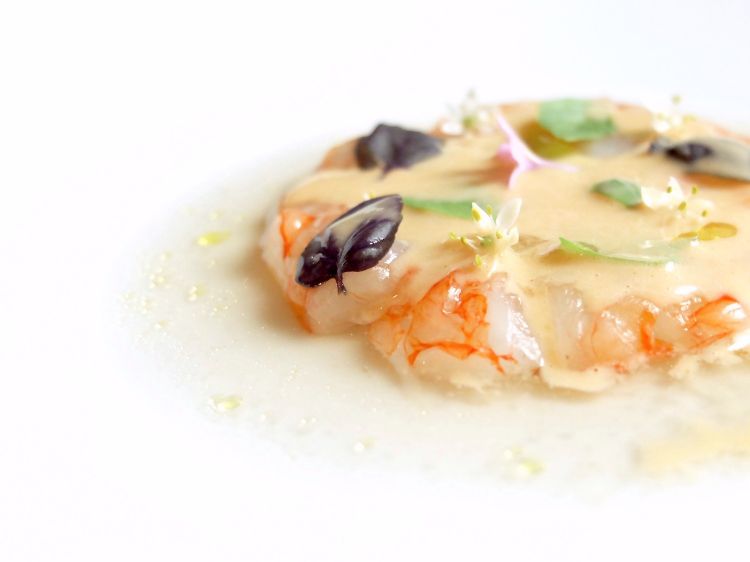
Prawns in brine: prawns from Sanremo, coulis made with their roasted heads, brine from taggiasche olives
Even the brine water that brings back to the waters of the purple prawns from Sanremo is very delicate. The following dishes are more incisive, in a perfectly designed escalation. In Amande the perfectly clean finish is surprising, with the bitter note of the apricot kernels in contrast with the initial sweetness of the scampi in honey. In-fiore is instead a perfect celebration of different kinds of courgettes: pastissona bianca, golden, tonda di Nizza, lunga di Albenga... They’re all paired with the "condimento al funghetto", a Calabrian sauce made with courgettes, mint and vinegar. In this case Mammoliti moves from travels to memories – his grandparents on his father’s side are originally from Calabria and used to run Americano in Avigliana, where the chef took his first steps.
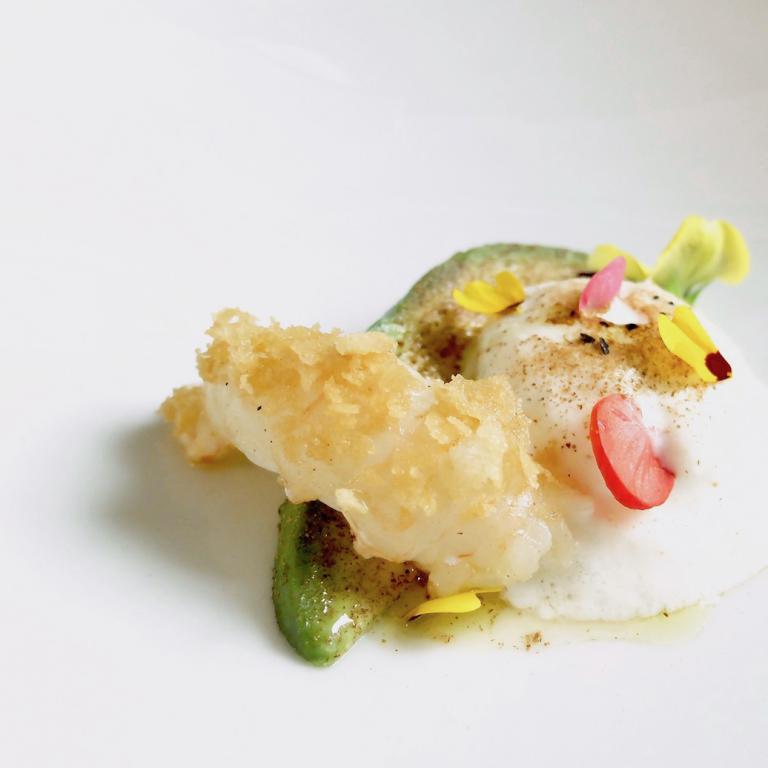
Amande: roasted scampi with rhododendron honey, avocado with cinnamon, mousse of apricot kernels, powdered coffee
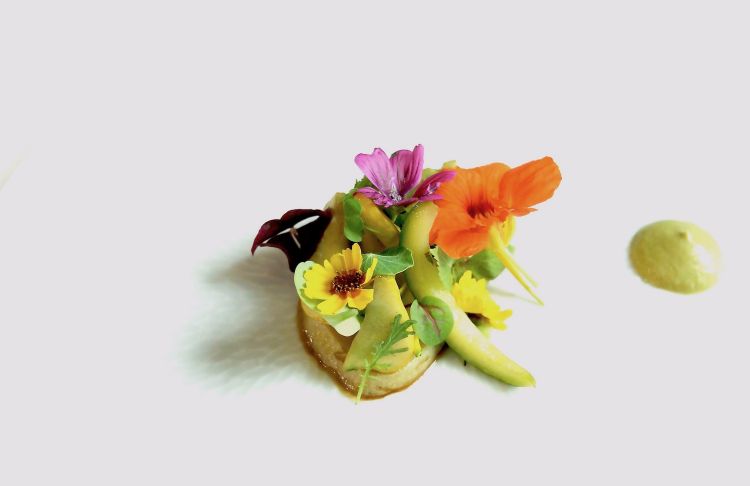
In-fiore: courgettes cooked in a juice of grilled vegetables, with “condimento al funghetto”
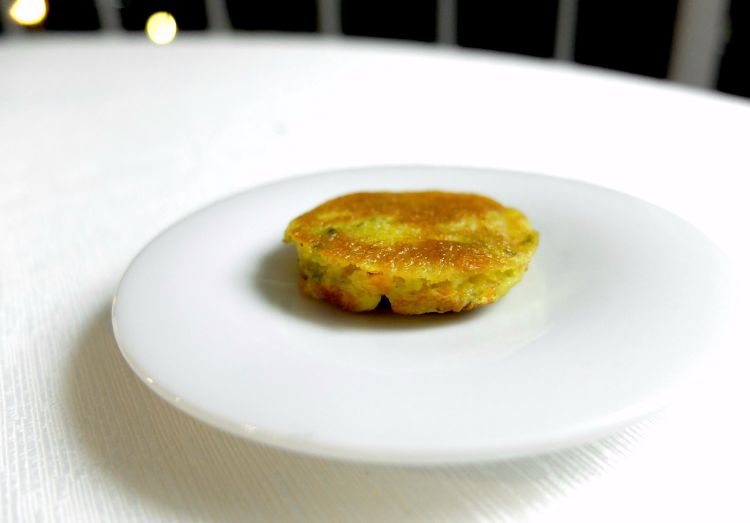
A pancake of courgette flowers
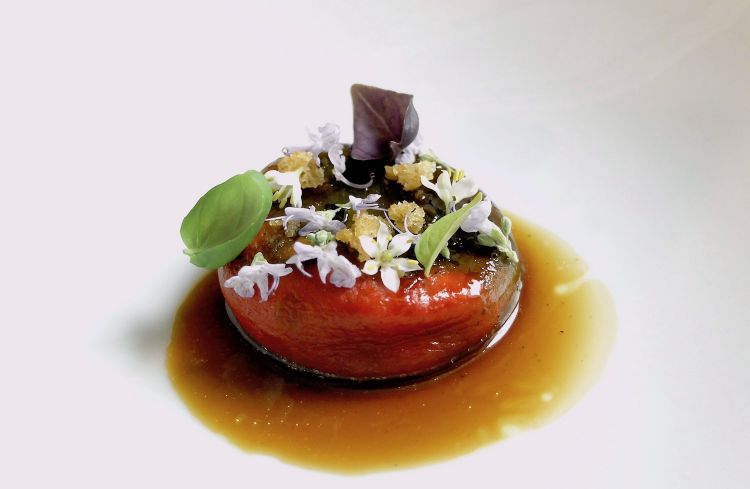
Karma: roasted pepper from Capriglio, cream of anchovies, juice of toasted peppers
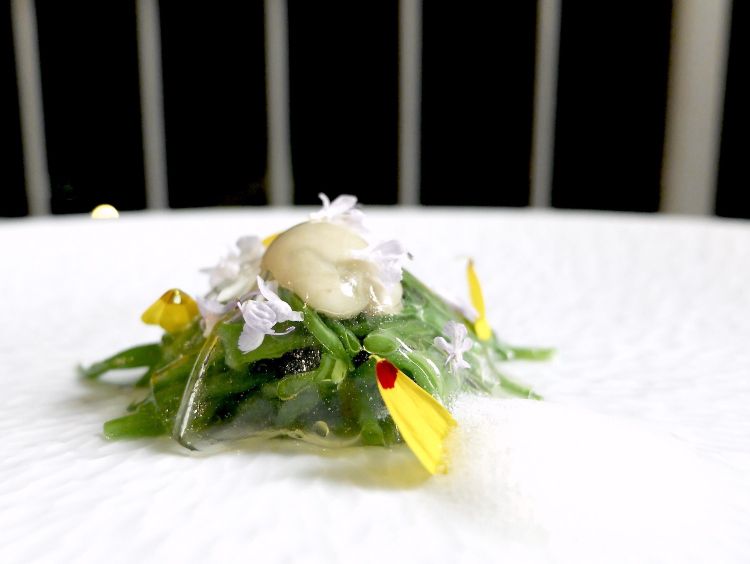
Oyster and French beans “giardiniera”, with giardiniera infusion
Karma and Oyster and French bean “giardiniera” continue the climb: the flavours are stronger and stronger, extreme. In particular, the latter shows a strong acidity, which the chef solves in the following dish, which becomes a masterpiece not just by itself, but also because it arrives at the right moment, Pane e mortadella. It’s delicious and comforting, the necessary truce.
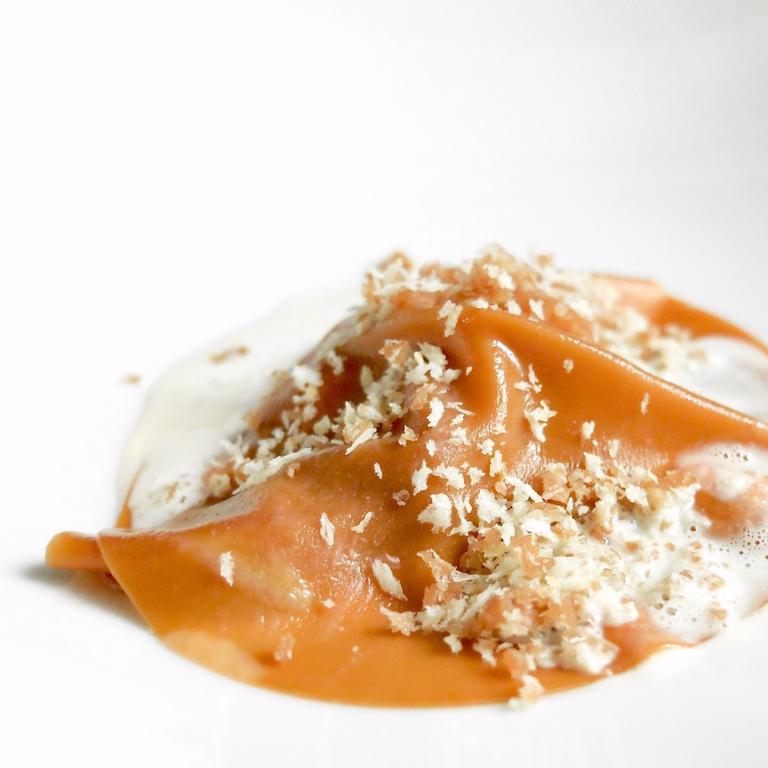
Pane e mortadella: fresh egg pasta made with an extract of mortadella, cream of pistachios from Bronte, juice of Pondicherry Indian pepper, cream of mortadella
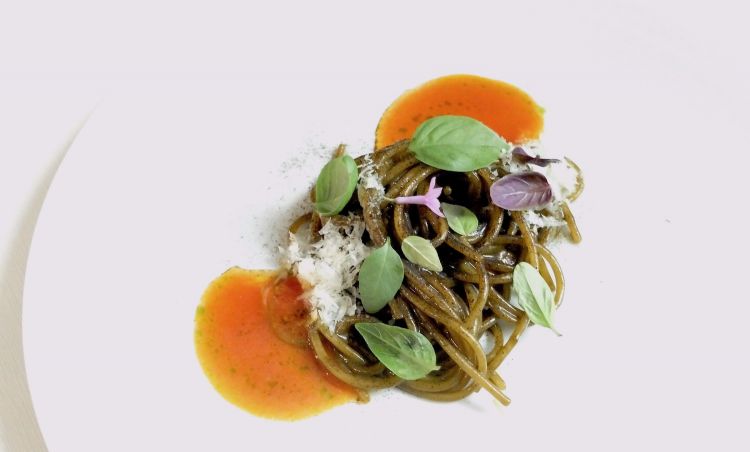
Ritorno a casa: spaghetti alla parmigiana, coulis of preserved tomato
Ritorno a casa, too, confirms the moment of peace. Another dish dedicated to memories, spaghetti cooked in an extract of roasted aubergines (repeating a technical artifice that is typical of Mammoliti: spaghetti cooked in an extract of prosciutto from Cuneo; spaghetti in an extract of roasted peppers, spaghetti in an extract of roast chicken, spaghetti in an extract of pizza...), with a cream of parmigiana and a coulis of preserved tomato. «It’s a mum-dish».
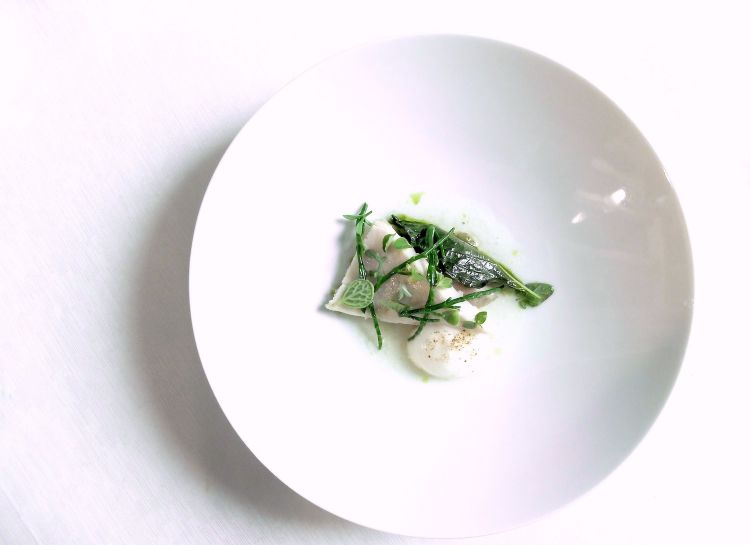
Pacific: jowl bacon of hamachi, caper mousseline, salmoriglio tea. Hamachi is the amberjack of the Pacific Ocean
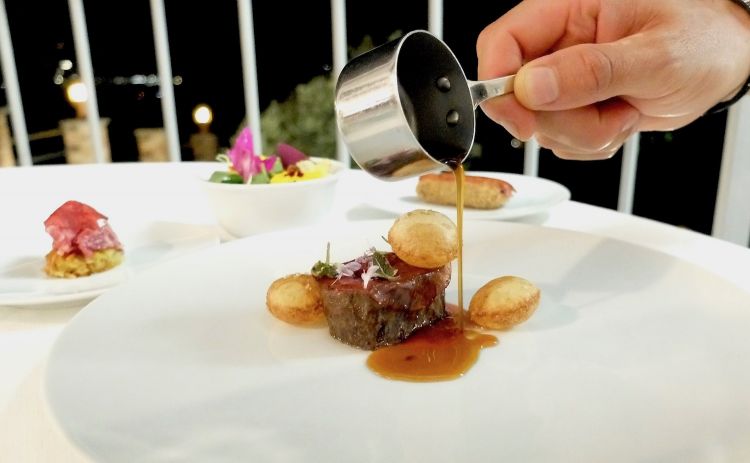
Carpione: roasted fillet of Rubia Gallega, jus aromatised with bay leaves. On the side, Carpaccio with pommes paillasson
The two main courses are both spectacular: Pacific, an elegant caress on the palate; Carpione, the meaty silkiness of Rubia Gallega.
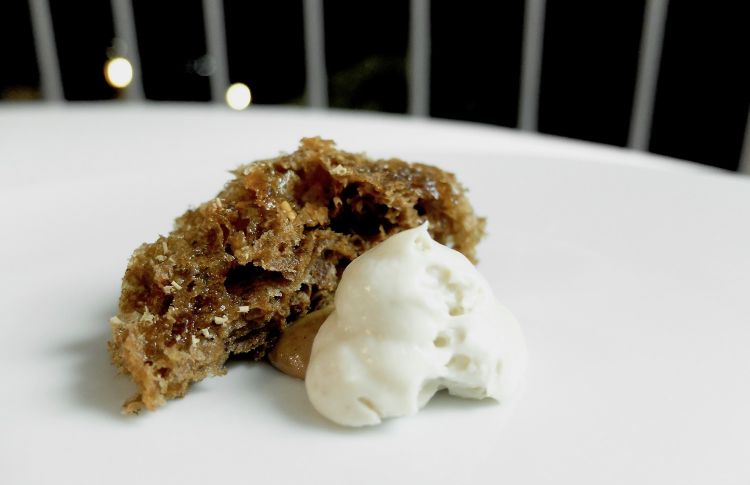
Bisquit with Tonka beans and asperula, hazelnut praline, cream of fermented bread
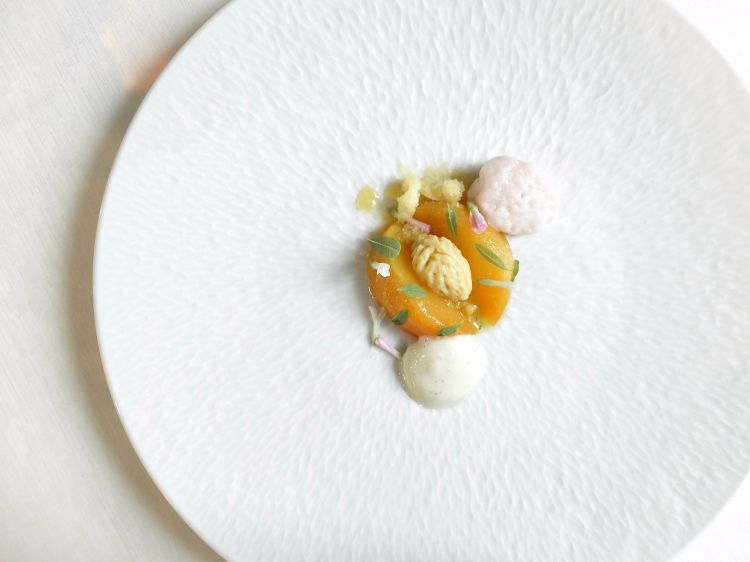
Per-seca: peach in its essence, macerated in red wine, verbena and almond tea
And even the final dessert, Per-seca, is of the highest standards: baked peach confit, later marinated in red wine; peach jam with verbena; almond cream and a mousse with red wine; the stone is made with a peach mousse.
Michelangelo Mammoliti will be at Identità Golose Milano with the restaurant's coordinator Andrea Ribaldone, from Wednesday 30th October to Saturday 2nd November with a menu dedicated to truffle. For reservations click here.
Translated into English by Slawka G. Scarso